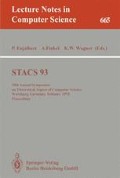Abstract
In this paper we deal with the granularity problem, that is, the problem of implementing a shared memory in a distributed system where n processors are connected to n memory modules through a complete network (Module Parallel Computer). We present a memory organization scheme where m ∈ ⊗(n 2) variables, each replicated into a 2c — 1 copies (for constant c), are evenly distributed among the n modules, so that a suitable access protocol allows any set of at most n distinct read/write operations to be performed by the processors in O(√n) parallel steps in the worst case. The well known strategy based on multiple copies is needed to avoid the worst-case O(n)-time, since only a majority of the copies of each variable need be accessed for any operation. The memory organization scheme can be extended to deal with m ∈ ⊗(n 3) variables attaining an O(n 2/3)-time complexity in the worst case.
This paper was partially supported by NFS Grant CCR-91-96152.
Preview
Unable to display preview. Download preview PDF.
References
H. Alt, T. Hagerup, K. Mehlhorn, and F.P. Preparata. Deterministic simulation of idealized parallel computers on more realistic ones. SIAM J. on Computing, 16(5):808–835, 1987.
N. Alon and V. D. Milman. λ1, isoperimetric inequalities for graphs and superconcentrators. Journal of Combinatorial Theory Series B, 38:73–88, 1985.
D.K. Gifford. Weighted voting for replicated data. Proc. of the 7th ACM Symp. on Operating System Principles, pages 150–159, 1979.
M. Hall Jr. Combinatorial Theory. John Wiley & Sons, New York NY, second edition, 1986.
K.T. Herley. Efficient simulations of small shared memories on bounded degree networks. Proc. of the 30th IEEE Symp. on Foundations of Comp. Sc., pages 390–395, 1989.
K.T. Herley. Space-efficient representations of shared data for parallel computers. Proc. of the 2nd ACM Symp. on Parallel Algorithms and Architectures, pages 407–416, 1990.
A.R. Karlin and E. Upfal. Parallel hashing: An efficient implementation of shared memory. J. ACM, 35(4):876–892, 1988.
D.J. Kuck. A survey of parallel machine organization and programming. ACM Computing Surveys, 21:339–374, 1977.
F. Luccio, A. Pietracaprina, and G. Pucci. A probabilistic simulation of PRAMs in VLSI. Information Processing Lett., 28(3):141–147, 1988.
F. Luccio, A. Pietracaprina, and G. Pucci. A new scheme for the deterministic simulation of PRAMs in VLSI. Algorithmica, 5:529–544, 1990.
K. Mehlhorn and U. Vishkin. Randomized and deterministic simulations of prams by parallel machines with restricted granularity of parallel memories. Acta Informatica, 9(1):29–59, 1984.
A.G. Ranade. How to emulate shared memory. J. on Computers and System Sci., 42:307–326, 1991.
R.M. Tanner. Explicit concentrators from generalized n-gons. SIAM J. on Algebraic Discrete Methods, 5(3):287–293, 1984.
E. Upfal and A. Widgerson. How to share memory in a distributed system. J. ACM, 34(1):116–127, 1987.
Author information
Authors and Affiliations
Editor information
Rights and permissions
Copyright information
© 1993 Springer-Verlag Berlin Heidelberg
About this paper
Cite this paper
Pietracaprina, A., Preparata, F.P. (1993). An O(√n)-worst-case-time solution to the granularity problem. In: Enjalbert, P., Finkel, A., Wagner, K.W. (eds) STACS 93. STACS 1993. Lecture Notes in Computer Science, vol 665. Springer, Berlin, Heidelberg. https://doi.org/10.1007/3-540-56503-5_14
Download citation
DOI: https://doi.org/10.1007/3-540-56503-5_14
Published:
Publisher Name: Springer, Berlin, Heidelberg
Print ISBN: 978-3-540-56503-1
Online ISBN: 978-3-540-47574-3
eBook Packages: Springer Book Archive

